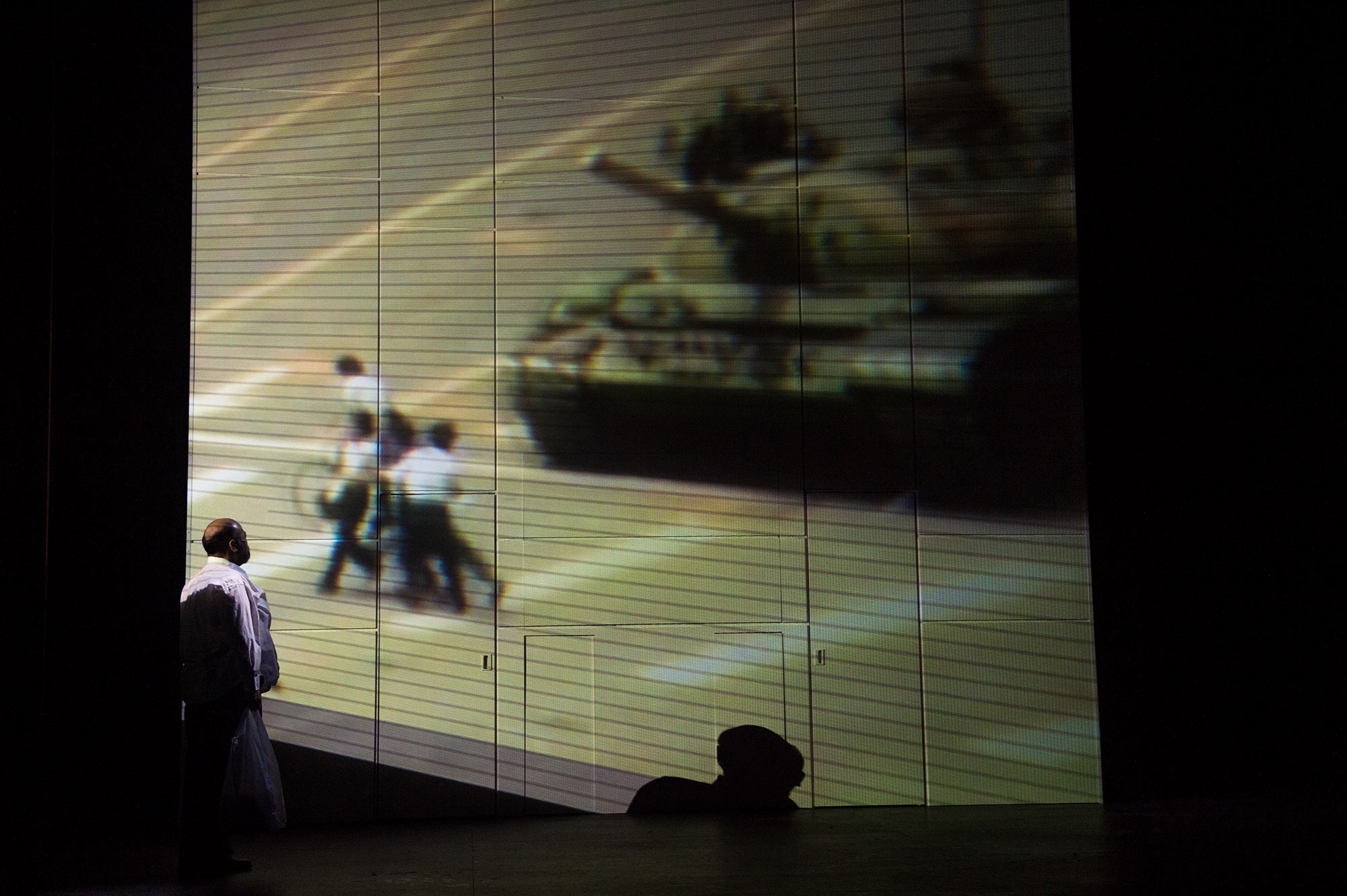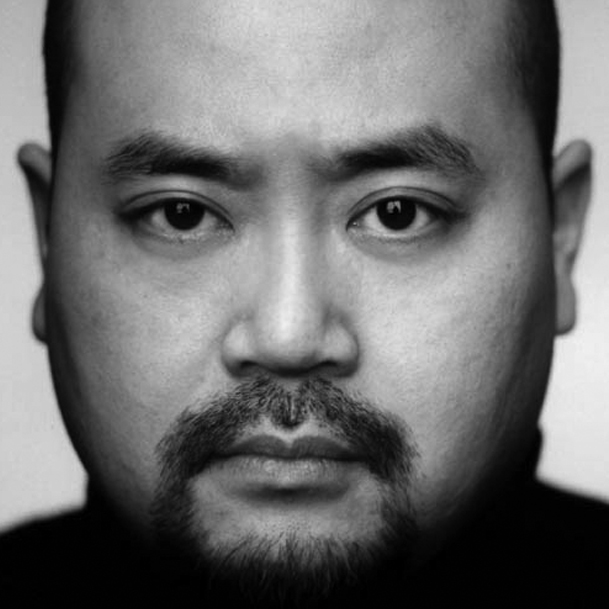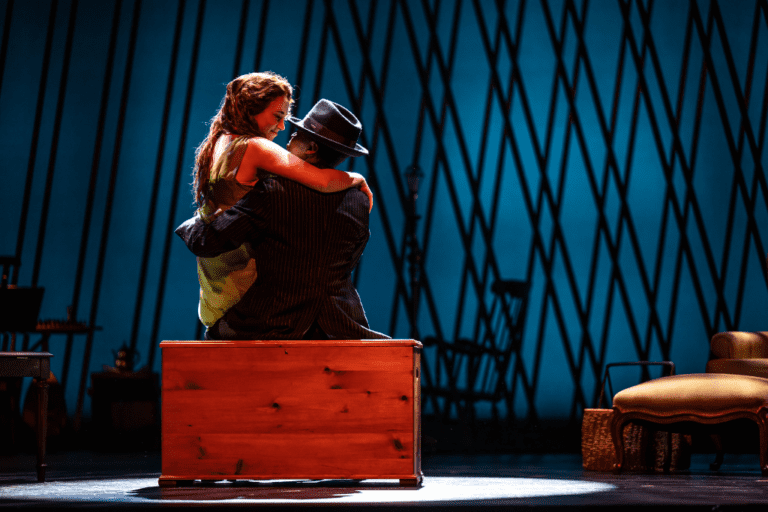Coming to Chimerica
My Mandarin sucks.
There, I said it. But I’m working on it. Working hard to make sure I’m using the correct tone (out of four possible tones) so that the words I’m supposed to be saying in Mandarin have the correct meaning. We’re four weeks into rehearsals of Lucy Kirkwood’s Chimerica, directed by Chris Abraham, at the Royal Manitoba Theatre Centre, and I feel like I’m going mad. We’re in the midst of the most insanely complicated tech rehearsal I’ve ever been involved in, while working extended days far away from home, and trying to learn one of the most complex languages on the planet.
I am not Chinese.
“Yào yī gè néng zì yóu hū xī de běi jīng!” is what I think is coming out of my mouth, which translates to: “Breathe freely Beijing!” It’s a line spoken by the character I play, Zhang Lin, who finally decides to take a stand and lead a protest about the air pollution in the Chinese capital. I look into the patient-but-slightly-exasperated eyes of Jasmine Chen, our Mandarin language captain and fellow castmate, as she corrects me for the umpteenth time.
“Nung tzoo yo,” she says.
“Nung zoo yoh,” I try to repeat.
“Stop lisping the tzoo. Push the tip of your tongue against the back of your teeth and cup the back of your tongue: ‘Nung tzoo yo. Nung tzoo yo.’” She demonstrates.
“Nung Tzooo Yoh.”
“Nung tzoo yo.”
“Nung Tzooo Yoh.”
“Tzoo.”
“Tzooo.”
“Tzoo!”
“Tzooo.”
“Tzoo!”
“Tzoo!!”
“TZOO!!!!”
“THAT’S WHAT I’M SAYING!!!”
“Don’t worry,” she says. “You’re getting better!”
“Why must you turn this greenroom into a den of lies?” I think to myself, rather sullenly.
Not for the first time, I question why I took this gig. Why am I in Winnipeg in February doing a show that requires me to not only speak with a Mandarin accent, but actual Mandarin?
Did I mention I’m not Chinese?
For the last four years, I’ve been the lead in the spectacularly successful Kim’s Convenience, a show that’s well in my wheelhouse. In it, my character, Appa, speaks in broken English with a Korean accent, and has dialogue in Korean. I’m Korean, and though my ability to speak my parents’ native tongue is far from perfect, I’ve grown up with the language and know enough to make it sound authentic. Plus, I know the character of Appa inside and out, a luxury that comes from being involved in the development of the play and character over the last seven years. Having done a whopping 390 performances of Kim’s Convenience across nine cities in Canada, I’ve become quite spoiled. The play is rather simple in its structure: there’s basically one setting, the titular convenience store (the only other being a church, which is set in the same place under different lighting), I wear a single costume, and the story takes place over the course of a day. That’s not to say it’s an easy show to do; there’s a great high-wire act of balancing the humour with the drama, and the play deals with heavy emotional issues of family love, forgiveness, and legacy. By the end of the show, which clocks in at a perfect hour and twenty minutes with no intermission, I’m quite drained, emotionally and physically.

Kim’s Convenience
Chimerica, however, is a beast. Epic in structure and story, it takes place over two continents, three cities, and twenty-three years. There are over forty scene changes, a stage revolve, a massive twenty-foot wall with inset doors on said revolve, “barn doors” that move onstage and off, a set of “scrim” doors that do the same further downstage, masking and other large set pieces that make full use of the theatre’s fly gallery, video projections, a sweeping sound design, and a lighting design that puts most rock and roll shows to shame. Add twelve actors to the mix, most of them playing multiple characters with perfectly unique costumes, wigs, and personal props… Well, there are a lot of moving parts. The first time we stumbled through the play in rehearsal, the running time, including a twenty-minute break, was three hours and twenty minutes.
I’m not sleeping well in Winnipeg.
The MTC has put us up at the lovely Fort Garry Place. It’s clean, quiet, comfortable, and within walking distance to the theatre. It’s perfect. But I can’t sleep.
I miss my family too much. I have two boys at home, aged eleven and six, and they are the light of my life. I’ve been blessed with the opportunity to be a stay-at-home dad for much of their lives and it’s ruined me. I’m also madly in love with my supportive and beautiful wife and I miss having her hold my hand as we walk home from dropping the boys off from school, or going out on quick lunch dates, or just hanging around at home doing silly, boring domestic stuff. The Fort Garry apartment is too quiet. Too empty. Sure, there’s modern technology: I can FaceTime my boys but I can’t hug them or kiss them goodnight. I’m cooking for one instead of four and I just can’t seem to get the proportions right. I can’t sit beside my wife with her head on my shoulder as we watch The Walking Dead. So I dive into my script for Chimerica and once again go over my lines in Mandarin. I start to feel like a hermit. I start to hate my decision to do this play.
So why did I do it?
I believe that as an artist (and I try not to roll my eyes as I say this, because I always feel a bit like a pretentious douchebag when I refer to myself as an artist) it’s necessary to be challenged in order to grow. Safe is boring. Safe is stagnation. Safe is death. Safe is what you do when you’re done with whatever it is you’re doing and you want to start mailing it in. So to foster my growth as an actor and artist (insert eye roll), I look for roles that will push me out of my comfort zone and get me to do things that frighten me a little. Things that I’m not quite sure I can pull off believably and authentically. That’s not to say that my involvement in Kim’s Convenience is safe. Hell no! The role of Appa continues to challenge and delight me. I know I can bring a sense of confidence and assuredness to my character, and I find it quite gratifying, but to be frank: I’ve done it. I know I can do it. The risks aren’t as high. The challenge lies elsewhere for that role. When I read Chimerica for the first time, I enjoyed the script and was fascinated by the character of Zhang Lin. I saw the inherent challenges of playing the role as a non-Chinese, non-Mandarin speaking actor. He was certainly far different from what I’d been playing in Kim’s: different culture, different age, different story altogether. I honestly didn’t know if I could do the part justice. It would be a challenge, it would be something I’d have to work extra hard to accomplish.
It would come at a cost.
The cost was being away from home. Away from my family. Being in a city I’d only spent a month in two years before. Working with actors and artists I’d never worked with and not really knowing what the dynamic in the room would be. Fears, doubts, concerns, all those emotions that can cause people to stop taking risks, stop growing.
But the rewards! The people I had the chance to work with were the best in their fields. Every super talented, generous, hard-working, committed artist putting aside their egos to tell the story of Chimerica. It was incredible. By opening night, we had shaved over twenty minutes off the show, bringing us under the three-hour mark, including a twenty-minute intermission.
“Yào yī gè néng zì yóu hū xī de běi jīng!” I look hopefully at Jasmine.
“Better!” she says.
Yes. Doing Chimerica would come at a cost. But never at an expense.
When I had the offer to work on Chimerica, I was intrigued by the chance to work with one of the top directors Canada has to offer, Chris Abraham, not to mention the actors involved: Evan Buliung and Laura Condlin, whose work I had admired from afar. There were my friends Richard Lee, Diana Tso, Norman Yeung, all of whom I’d worked with before in Toronto. I got to meet the fabulous Jasmine Chen, whose path I’d never had the pleasure of crossing before, and the amazing local talent of Kevin Klassen, Terry Cherniack, Elena Anciro, Ross McMillan, and Doug McKeag. Then there was the fantastic stage management team led by Karyn Kumhyr, Mike Duggan, and Linsey Callaghan who kept their shit together while we got dropped into the meat grinder of this show. The spectacular designers: Judith Bowden, Michael Walton, Thomas Ryder Payne and Deco Dawson. I got to know this extremely talented guy by the name of Zach Russell who was Chris’s assistant and who I’d work with again in an instant. Eric Armstrong who was our tireless dialect coach and the inspirational Dr. Yuan Liu took on the herculean task of teaching all the actors Mandarin. The entire machine of RMTC: too numerous to mention but top-notch in every aspect. This company became my family. And I have been incredibly fortunate to work with all involved.









Comments